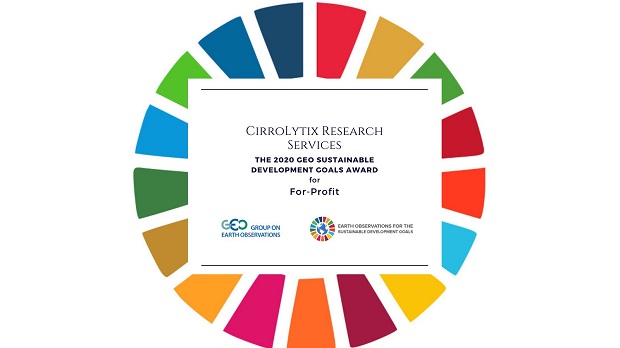A Filipino startup has been recognized globally for developing a dengue hotspot prediction system using satellite and climate data.

Local startup CirroLytix Research Services was acknowledged in the 2020 Group on Earth Observations Sustainable Development Goals (GEO SDG) Awards, which recognizes the use of Earth observations to support sustainable development.
The Advanced Early Dengue Prediction and Exploration Service (Project AEDES) is one of the CirroLytix’s flagship projects developed during the 2019 National Aeronautics and Space Administration’s (NASA) International Space Apps Challenge. It combines digital, climate, and remote sensing to nowcast dengue trends and detect mosquito habitats to help pre-empt cases of dengue.
Project AEDES process leverages normalized difference vegetation index (NDVI), Fraction of absorbed photosynthetically active radiation (FAPAR), and normalized difference water index (NDWI) readings from Landsat and Sentinel-2 to estimate still water areas on the ground, which is correlated with dengue case counts from national health centers.
Dominic Vincent “Doc” Ligot, co-founder and chief technology officer of CirroLytix, described Project AEDES as an “early detection of panics from online searches, anticipating case counts from environment readings, but most importantly pinpointing hotspots from mosquito habitat detection.”
The Pinoy-made dengue mapper tool won the annual international hackathon of NASA globally in the best use of data, the solution that best makes space data accessible, or leverages it to a unique application.
Aside from winning last year, CirroLytix also developed an integrated public policy information portal measuring the impact of the coronavirus pandemic using Earth observation, in-country economic and human mobility data, and global infection case counts, thus winning again in the Space Apps Covid-19 Challenge for the same category in the best use of data.
Named GIDEON (Global Impact Detection from Emitted Light, Onset of Covid-19, and Nitrogen Dioxide), this dashboard for policy makers and economic planners shows the impact of Covid-19 on various countries and effects on the economy and environment.
The startup continues to update the AEDES framework to include socio-economic risk mapping to turn it into a health and environmental policy tool.
Aside from dengue, the company also supports Covid-19 modeling and response initiatives with the public health sector. CirroLytix’s current involvements include public health, human rights, fighting disinformation, education and food security.
Michael Lance M. Domagas, lead organizer of Space Apps in the Philippines, appealed for support for the Filipino winners.
“How many times should these Filipino innovators and achievers need to win before being recognized and appreciated by our own country? To be recognized by not just one, but five space agencies is something has not yet been achieved by Filipinos, how much more of a multitude of countries and nations supporting the sustainable development goals of the United Nations?”
He added: “The dengue epidemic and the Covid-19 is a real threat to the Philippine society right now, endangering health, well-being, livelihood, and most especially businesses and the national economy. If we could only learn how to give value to science, technology, mathematics, and engineering (STEM), the possibilities are endless. Our Filipino winners of Space Apps and GEO SDG Awards have taught us on how these space technologies greatly help in addressing epidemics and economic impact of Covid-19, its time to give them recognition and respect because they are Filipinos like us.”




